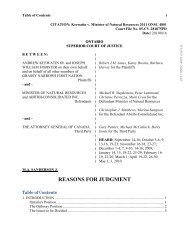COURT OF APPEAL FOR ONTARIO
COURT OF APPEAL FOR ONTARIO
COURT OF APPEAL FOR ONTARIO
Create successful ePaper yourself
Turn your PDF publications into a flip-book with our unique Google optimized e-Paper software.
Page: 88<br />
reading of the reasons in Longo indicates that the evidentiary record was not sufficient to<br />
permit the application judge to decide the case. In addition, the application judge noted<br />
that conflicts in the evidence necessitated credibility findings that required a trial.<br />
[218] We reject the appellant‟s suggestion that certain categories of claims should not be<br />
decided on a motion for summary judgment. According to the appellant, a claim for a<br />
prescriptive easement requires findings of credibility concerning the use of the claimed<br />
easement lands, which should not be made on a summary judgment motion. The<br />
appellant‟s position ignores the fact-finding powers afforded to the motion judge by rule<br />
20.04(2.1), including the express power to make credibility findings. As we have said, the<br />
test for exercising the powers conferred by rule 20.04(2.1) is whether the full<br />
appreciation of the evidence and issues that is required to make dispositive findings is<br />
possible on a motion for summary judgment.<br />
[219] This case is a good example of the type of case that is amenable to summary<br />
judgment based on the application of the full appreciation test. The documentary<br />
evidence was limited and not contentious. There were a limited number of relevant<br />
witnesses. The governing legal principles were not in dispute. It was thus entirely<br />
appropriate for the motion judge to decide the action on a Rule 20 motion.
















